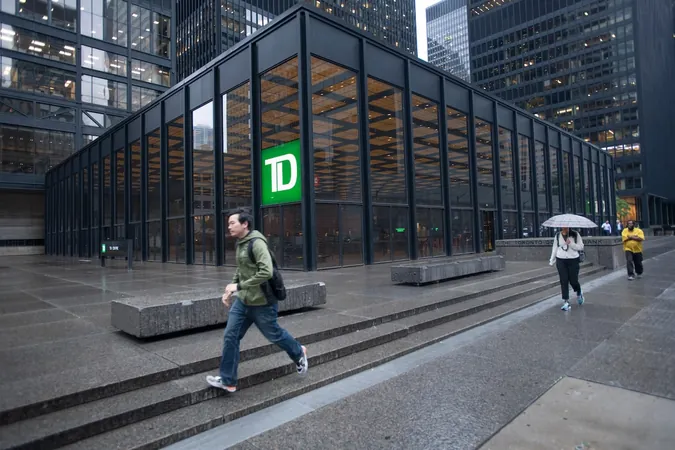
TD Bank's Strategic Overhaul: Can It Survive Regulatory Strains?
2024-10-11
Author: Michael
Introduction
In a dramatic turn of events, Toronto-Dominion Bank (TD) is grappling with a challenging future as regulatory pressures tighten their grip on its U.S. operations, raising serious concerns about the bank's growth trajectory and profitability. Recently, TD faced a significant blow, pleading guilty to felony charges related to its anti-money laundering (AML) failures and agreeing to pay a staggering $3.09 billion in penalties.
Regulatory Constraints
As a result of these sanctions, U.S. regulators have imposed an indefinite asset cap on TD's U.S. retail banking subsidiaries, limiting their assets to a maximum of $434 billion. This restriction complicates TD's ability to innovate, launch new products, or expand its branches in the U.S. market, compelling the bank to strategize anew just to keep pace with competitors.
Strategic Adjustments
To comply with these newfound limitations, TD plans to reduce its U.S. retail assets by 10% to create a buffer against the asset cap and increase its cash reserves. The focus will undoubtedly shift toward TD's operations in Canada, where the market is already quite saturated, and its wholesale banking division, which is seeing growth but hasn't yet emerged as a major player.
Leadership Changes
Leadership transitions add another layer of complexity. Raymond Chun is set to take the reins as CEO in April, following the retirement of Bharat Masrani. Chun, who is known for his operational excellence and ability to turn around underperforming divisions, now faces the daunting task of steering TD through this tumultuous phase.
Internal Morale and Compliance Failures
Internal morale has taken a hit as employees express feelings of embarrassment and anger over the decade-long compliance failures. Critics within the bank have raised serious questions about how a compliance system meant to catch even minor issues overlooked illicit activities linked to U.S. drug dealers for years.
Shift to Corporate Clients
In response to the crisis, TD is pivoting its strategy toward corporate clients. With the encouragement of senior leadership, including Chun and Masrani, the bank aims to allocate more resources to investment banking services and corporate lending, expecting these areas to flourish and help stabilize revenues.
Market Reaction and Analyst Opinions
However, the pressure is immense for Chun to prove that TD can recover its footing. Analysts at RBC Dominion Securities have downgraded their outlook, suggesting that TD’s management credibility has suffered, leading to a more discounted market valuation than its peers. TD’s stock has already taken a hit, dropping over 10% in just two days, signaling investors' concerns about the bank's future.
Talent Retention Challenges
TD's ability to retain top talent is also under threat, as respected leaders are reportedly leaving the organization, further complicating its restructuring efforts. The U.S. Department of Justice has revealed that the bank has clawed back approximately $2 million in executive compensation amidst the fallout, signaling a tough stance on accountability.
Future Outlook
Looking ahead, while 2025 is framed as a transition year by TD’s leadership, analysts forecast a prolonged period of restrained growth, pointing to historical cases where similar regulatory actions led to extended recovery times. The comparison to other institutions mired in scandal, like Wells Fargo, serves as a cautionary tale for TD as it seeks to regain its former standing.
Conclusion
As TD navigates this crisis, maintaining customer trust will be pivotal. TD’s long-held reputation for excellent customer service will be tested as the bank aims to reassure clients of its stability and commitment to service amidst an unprecedented shakeup.
In summary, TD Bank's road ahead is fraught with challenges as it strives to adapt to a new regulatory environment. The outcome is uncertain, but one thing is clear: the stakes are high, and how the bank responds in the coming months could well dictate its future stability and growth. Will TD manage to turn the tide, or have these sanctions irreparably damaged its standing? The clock is ticking.









 Brasil (PT)
Brasil (PT)
 Canada (EN)
Canada (EN)
 Chile (ES)
Chile (ES)
 España (ES)
España (ES)
 France (FR)
France (FR)
 Hong Kong (EN)
Hong Kong (EN)
 Italia (IT)
Italia (IT)
 日本 (JA)
日本 (JA)
 Magyarország (HU)
Magyarország (HU)
 Norge (NO)
Norge (NO)
 Polska (PL)
Polska (PL)
 Schweiz (DE)
Schweiz (DE)
 Singapore (EN)
Singapore (EN)
 Sverige (SV)
Sverige (SV)
 Suomi (FI)
Suomi (FI)
 Türkiye (TR)
Türkiye (TR)